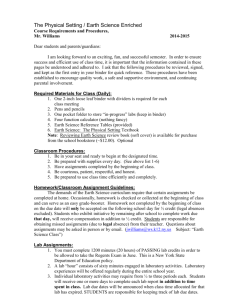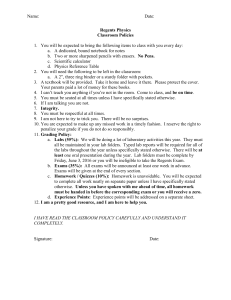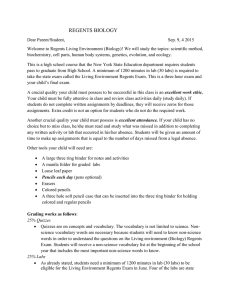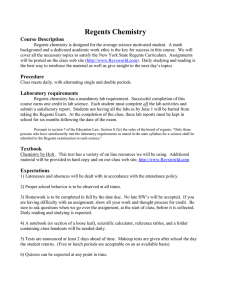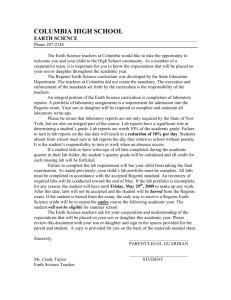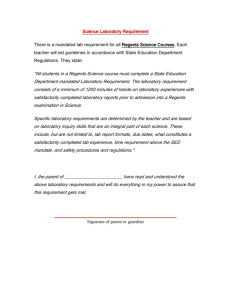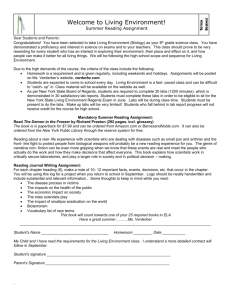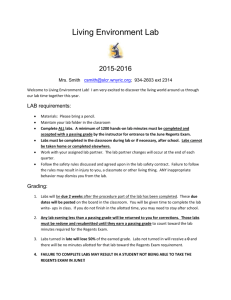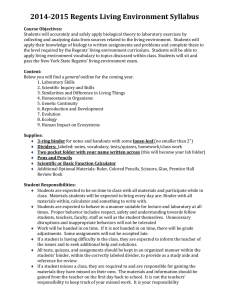The Physical Setting / Earth Science
advertisement
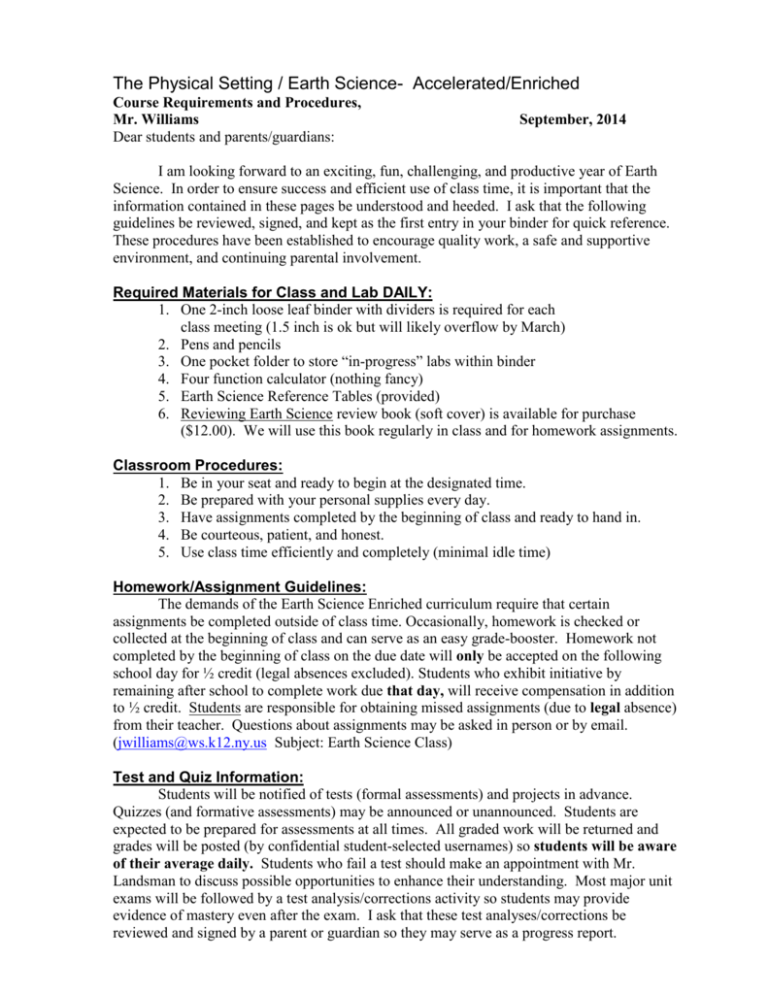
The Physical Setting / Earth Science- Accelerated/Enriched Course Requirements and Procedures, Mr. Williams Dear students and parents/guardians: September, 2014 I am looking forward to an exciting, fun, challenging, and productive year of Earth Science. In order to ensure success and efficient use of class time, it is important that the information contained in these pages be understood and heeded. I ask that the following guidelines be reviewed, signed, and kept as the first entry in your binder for quick reference. These procedures have been established to encourage quality work, a safe and supportive environment, and continuing parental involvement. Required Materials for Class and Lab DAILY: 1. One 2-inch loose leaf binder with dividers is required for each class meeting (1.5 inch is ok but will likely overflow by March) 2. Pens and pencils 3. One pocket folder to store “in-progress” labs within binder 4. Four function calculator (nothing fancy) 5. Earth Science Reference Tables (provided) 6. Reviewing Earth Science review book (soft cover) is available for purchase ($12.00). We will use this book regularly in class and for homework assignments. Classroom Procedures: 1. Be in your seat and ready to begin at the designated time. 2. Be prepared with your personal supplies every day. 3. Have assignments completed by the beginning of class and ready to hand in. 4. Be courteous, patient, and honest. 5. Use class time efficiently and completely (minimal idle time) Homework/Assignment Guidelines: The demands of the Earth Science Enriched curriculum require that certain assignments be completed outside of class time. Occasionally, homework is checked or collected at the beginning of class and can serve as an easy grade-booster. Homework not completed by the beginning of class on the due date will only be accepted on the following school day for ½ credit (legal absences excluded). Students who exhibit initiative by remaining after school to complete work due that day, will receive compensation in addition to ½ credit. Students are responsible for obtaining missed assignments (due to legal absence) from their teacher. Questions about assignments may be asked in person or by email. (jwilliams@ws.k12.ny.us Subject: Earth Science Class) Test and Quiz Information: Students will be notified of tests (formal assessments) and projects in advance. Quizzes (and formative assessments) may be announced or unannounced. Students are expected to be prepared for assessments at all times. All graded work will be returned and grades will be posted (by confidential student-selected usernames) so students will be aware of their average daily. Students who fail a test should make an appointment with Mr. Landsman to discuss possible opportunities to enhance their understanding. Most major unit exams will be followed by a test analysis/corrections activity so students may provide evidence of mastery even after the exam. I ask that these test analyses/corrections be reviewed and signed by a parent or guardian so they may serve as a progress report. Regents Science Course Laboratory Special Requirements: All students enrolled in New York State Regents Science courses MUST complete 1200 minutes (20 hours) of PASSING lab credits in order to be allowed to take the Regents Exam in June. This is a New York State Department of Education policy. A lab “hour” consists of sixty minutes engaged in laboratory activities. Individual laboratory activities may require from ½ to four periods each to complete. Students will receive several school days to complete each lab report in addition to time spent in the lab. STUDENTS are responsible for keeping track of lab due dates. Late labs will be downgraded at 10% per school day. Labs that receive a failing grade due to lateness may still be eligible for Regents credit (toward the required 1200 minutes) provided the student has earned 65% or better on the content of the lab paperwork. Incomplete labs should not be submitted. Incomplete lab reports will be immediately returned to the student. Returned labs that are considered failing (below 65%) must be corrected before Regents credit can be awarded. Because lab activities are designed as hands-on learning experiences that help students learn the required content and skills, failing lab reports must be corrected to passing status before the unit exam on that topic. If there are personal extenuating circumstances, please discuss your situation with me privately so we can work out a fair solution. All student lab work will be read and scored by the instructor and extensive written feedback will be provided as necessary. Following student review of lab report evaluation, passing lab reports become property of the State Education Department and will be securely stored in a student lab folder in the school. Scientific laboratory procedures require that students pay close attention to directions and details. Most lab activities will culminate with a written conclusion/discussion component. I encourage parents to assist students with proofreading and research skill development using multiple, diverse resources. I also encourage students to work in groups during data gathering and in-class investigations, but conclusions and follow-up discussion questions must be the work of the individual student. Regents Exam Part D – Performance Test The Earth Science Regents exam contains a lab performance component (Part D) that is typically administered in early June during class time. This exam represents about 15% of the total Regents exam score. The date of this examination will be announced well in advance. Grading Procedures: Class grades are based on a percentage system. At the end of the marking period, final grade will be based on the following: Class Work Tests = 40 % Quizzes = 20 % Class work = 15 % Homework = 5 % Laboratory Work/Reports Labs will be worth 20%. Labs will be graded using a percentage system. Each lab will be worth a certain amount of points, and the grade will consist of the total points earned divided by total points available. Final Assessment: The Enriched Earth Science program offers a progressive, multi-phase, authentic assessment approach to the final exam. Specific details regarding this approach can be found on the accompanying paperwork to be sent home in the first few weeks of the course. Grading Philosophy: All points are earned by a student or awarded to a student. I do not “take off” points from scored work. Instead, any score less than 100% is the result of the student falling short of earning the maximum points available. My goal is for student report card grades to accurately reflect the degree of mastery of skills and concepts in the NYS Earth Science Core Curriculum, and beyond. All graded work will be returned and posted grades will be updated, therefore, students are responsible for knowing their own current average. If students are unsure of their scores, would like to discuss their performance, get extra help, or make up work, I make myself available after school regularly and enjoy having company. “You CAN excel in this course. Excellence requires that you try your best, study regularly, complete all assignments, and stay actively involved in your own education. I cannot GIVE you an education. You must PURSUE and ATTAIN an education through persistent effort and toil. This is a tremendous undertaking, but your parents, friends, and I can help you along the way”. “If you plan to spend most of your life on this Earth, it makes sense to know a little about how it all works” Course Requirements (Please do not detach) We have read the above document and acknowledge so by signing below. We also commit to reviewing and signing the test analysis/progress that reports that follow unit exams. _______________________ Student Signature _______________________________ Parent/Guardian Signature(s) _________ Date Final Grade Calculations: 1) The marking periods during which you have class every day will count 30% each towards your final average 2) The marking periods during which you have class every other day will count 15% each towards your final average 3) Your Final exam (Phases 1-4) will count 10% towards your final average Example: 30% + 30% + 15% + 15% + 10% = 100%
